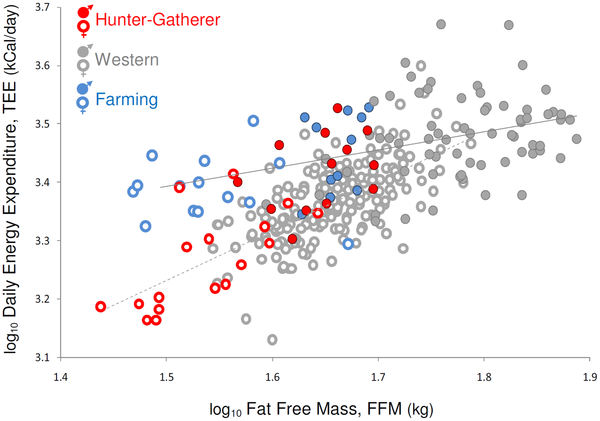But what does science say? There's no way to know but anthropologists are at least taking a shot at it. A new analysis, of modern hunter-gatherers anyway, found that there is no difference between their energy expenditure and Westerners, casting doubt on 'we don spend all day picking berries' hypothesis for obesity.
The research team measured daily energy expenditure (calories per day) among the Hadza, a population of traditional hunter-gatherers living in the open savannah of northern Tanzania. Despite spending their days trekking long distances to forage for wild plants and game, the Hadza burned no more calories each day than adults in the U.S. and Europe. The team ran several analyses accounting for the effects of body weight, body fat percentage, age, and gender. In all analyses, daily energy expenditure among the Hadza hunter-gatherers was indistinguishable from that of Westerners. The study was the first to measure energy expenditure in hunter-gatherers directly; previous studies had relied entirely on estimates.

Individual comparisons of TEE and FFM. Energy expenditure for Hadza hunter-gatherers (red circles) was similar to that of Westerners (gray [19]–[26]). Bolivian women farmers (blue open circles [13], [31]) had higher TEE than either Hadza or Western women. Trendlines are ordinary least squares regressions through Western men (solid line) and Western women (dashed line).
Source: doi:10.1371/journal.pone.0040503.g001
These findings dispute the assumption that our hunter-gatherer ancestors expended more energy than modern populations, and challenge the view that obesity in Western populations results from decreased energy expenditure. Instead, the similarity in daily energy expenditure across a broad range of lifestyles suggests that habitual metabolic rates are relatively constant among human populations. This in turn supports the view that the current rise in obesity is due to increased food consumption, not decreased energy expenditure.
Obviously, physical exercise is important for maintaining good health - the Hadza spend a greater percentage of their daily energy budget on physical activity than Westerners do, which may contribute to the health and vitality evident among older Hadza. Still, the similarity in daily energy expenditure between Hadza hunter-gatherers and Westerners suggests that we have more to learn about human physiology and health, particularly in non-Western settings.
"These results highlight the complexity of energy expenditure. It's not simply a function of physical activity," says Pontzer. "Our metabolic rates may be more a reflection of our shared evolutionary past than our diverse modern lifestyles."
Citation: Pontzer H, Raichlen DA, Wood BM, Mabulla AZP, Racette SB, et al. (2012) Hunter-Gatherer Energetics and Human Obesity. PLoS ONE 7(7): e40503. doi:10.1371/journal.pone.0040503





Comments